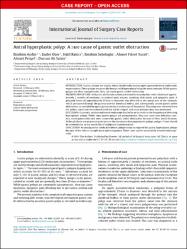Antral hyperplastic polyp: a rare cause of gastric outlet obstruction

View/
Access
info:eu-repo/semantics/openAccessDate
2014Author
Aydın, İbrahimÖzer, Ender
Rakıcı, Halil
Şehitoğlu, İbrahim
Yücel, Ahmet Fikret
Pergel, Ahmet
Şahin, Dursun Ali
Metadata
Show full item recordCitation
Aydin, I., Ozer, E., Rakici, H., Sehitoglu, I., Yucel, A.F., Pergel, A., Sahin, D.A., (2014). Antral hyperplastic polyp: A rare cause of gastric outlet obstruction. International Journal of Surgery Case Reports, 5(6), 287-289. https://doi.org/10.1016/j.ijscr.2014.03.016Abstract
INTRODUCTION Gastric polyps are usually found incidentally during upper gastrointestinal endoscopic examinations. These polyps are generally benign, with hyperplasia being the most common. While gastric polyps are often asymptomatic, they can cause gastric outlet obstruction. PRESENTATION OF CASE A 64 years-old female patient presented to our polyclinic with a history of approximately 2 months of weakness, occasional early nausea, vomiting after meals and epigastric pain. A polypoid lesion of approximately 25 mm in diameter was detected in the antral area of the stomach, which prolapsed through the pylorus into the duodenal bulbus, and subsequently caused gastric outlet obstruction, as revealed by upper gastrointestinal endoscopy of the patient. The polyp was retrieved from the pyloric canal into the stomach with the aid of a tripod, and snare polypectomy was performed. DISCUSSION Currently, widespread use of endoscopy has led to an increase in the frequency of detecting hyperplastic polyps. While most gastric polyps are asymptomatic, they can cause iron deficiency anemia, acute pancreatitis and more commonly, gastric outlet obstruction because of their antral location. Although there are no precise principles in the treatment of asymptomatic polyps, polyps >5 mm should be removed due to the possibility of malignant transformation. CONCLUSION According to the medical evidence, polypectomy is required for gastric hyperplastic polyps because of the risks of complication and malignancy. These cases can be successfully treated endoscopically. © 2014 The Authors.

















